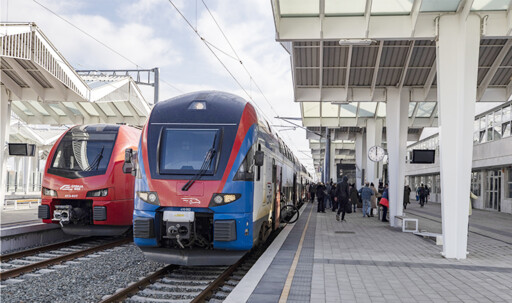


Symposium eyes China-CEEC shared development

A train arrives at the Novi Sad Station of the Hungary-Serbia Railway, a flagship project of China-CEEC cooperation. Photo: XINHUA
Scholars and representatives of think tanks from China and several Central and Eastern European countries (CEEC) gathered in Beijing on Nov. 28–29 to attend the 10th High-Level Symposium of Think Tanks of China and Central and Eastern European Countries. Focusing on the shared development of China and CEEC amid a changing world, attendees conducted in-depth discussions on practical and innovative approaches to China-CEEC cooperation, the partnership within the broader context of China-Europe relations, China-proposed global initiatives and CEEC’s development opportunities, and the region’s positions amid shifts in Europe’s geopolitical economy.
Addressing the opening ceremony, Zhao Zhimin, secretary general of the Chinese Academy of Social Sciences (CASS), pointed out that since the China-CEEC cooperation mechanism was established in 2012, the two sides have, essentially from scratch, built a cooperative framework that encompasses all dimensions, multiple levels, and extensive areas, upholding the principles of mutual respect and equality alongside the spirit of openness and inclusiveness.
From humble beginnings to continuous optimization and refinement, the framework has advanced both Chinese modernization and CEEC’s development, while making significant contributions to the peace, stability, and prosperity of Europe and the world at large, Zhao said.
Humanity’s pursuit of peace and development is at a critical crossroads amid an ongoing scientific and technological revolution, industrial transformations, the collective rise of Global South countries, increasing protectionism and unilateralism, and a declining global openness index, noted Hua Chunying, vice minister of foreign affairs of China. The China-CEEC cooperation mechanism underpins the healthy and stable development of China-Europe relations. In the face of an uncertain international landscape, China and CEEC should prioritize solidarity to unleash new vitality from their traditional ties.
Balázs Orbán, political director for the Hungarian prime minister, remarked that cooperation with China will present significant development opportunities for Hungary. He noted that the fruitful outcomes of the Hungary-China partnership have evidenced the success of interconnectivity. Stressing that interconnectivity is essential for every nation, Orbán expressed his hope that European countries will achieve substantive developments through mutually beneficial cooperation while enhancing exchanges and cooperation with China to jointly address the various challenges confronting humanity.
According to Former Prime Minister of the Czech Republic Jiri Paroubek, the Belt and Road Initiative (BRI) is a visionary project. China has actively pushed ahead with BRI projects, promoting economic and trade cooperation, dismantling trade barriers, and continuously developing infrastructure. Paroubek observed that substantial investments in infrastructure projects have led to the construction of numerous high-speed railways, expressways, ports and airports. These projects, he stated, have expedited growth in participating countries, injecting new impetus into global shared development.
Adrian Severin, former deputy prime minister of Romania, emphasized that the Central and Eastern Europe region serves as a critical crossroads where the East meets the West, playing a significant role in European integration. China-CEEC cooperation has accelerated the convergence of incomes in Eastern and Western Europe, thus fueling the integration of the continent. According to Severin, opportunities and challenges presently coexist in China-CEEC cooperation, requiring efforts to deepen pragmatic cooperation and prioritize sustainable and inclusive growth to create more opportunities for shared development and prosperity.
The symposium was co-hosted by CASS and the Secretariat of Cooperation between China and the Central and Eastern European Countries subordinate to the Chinese Ministry of Foreign Affairs, and organized by the Institute of European Studies, the China-CEEC Think Tanks Network, and the China-CEE Institute, all under CASS.
Editor:Yu Hui
Copyright©2023 CSSN All Rights Reserved